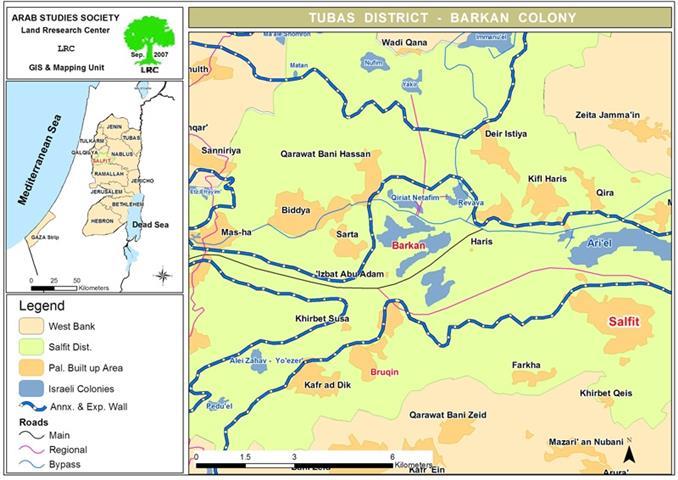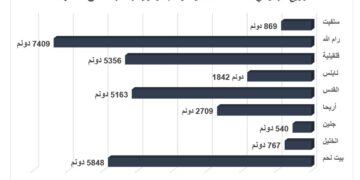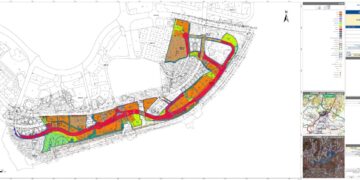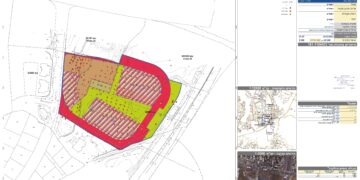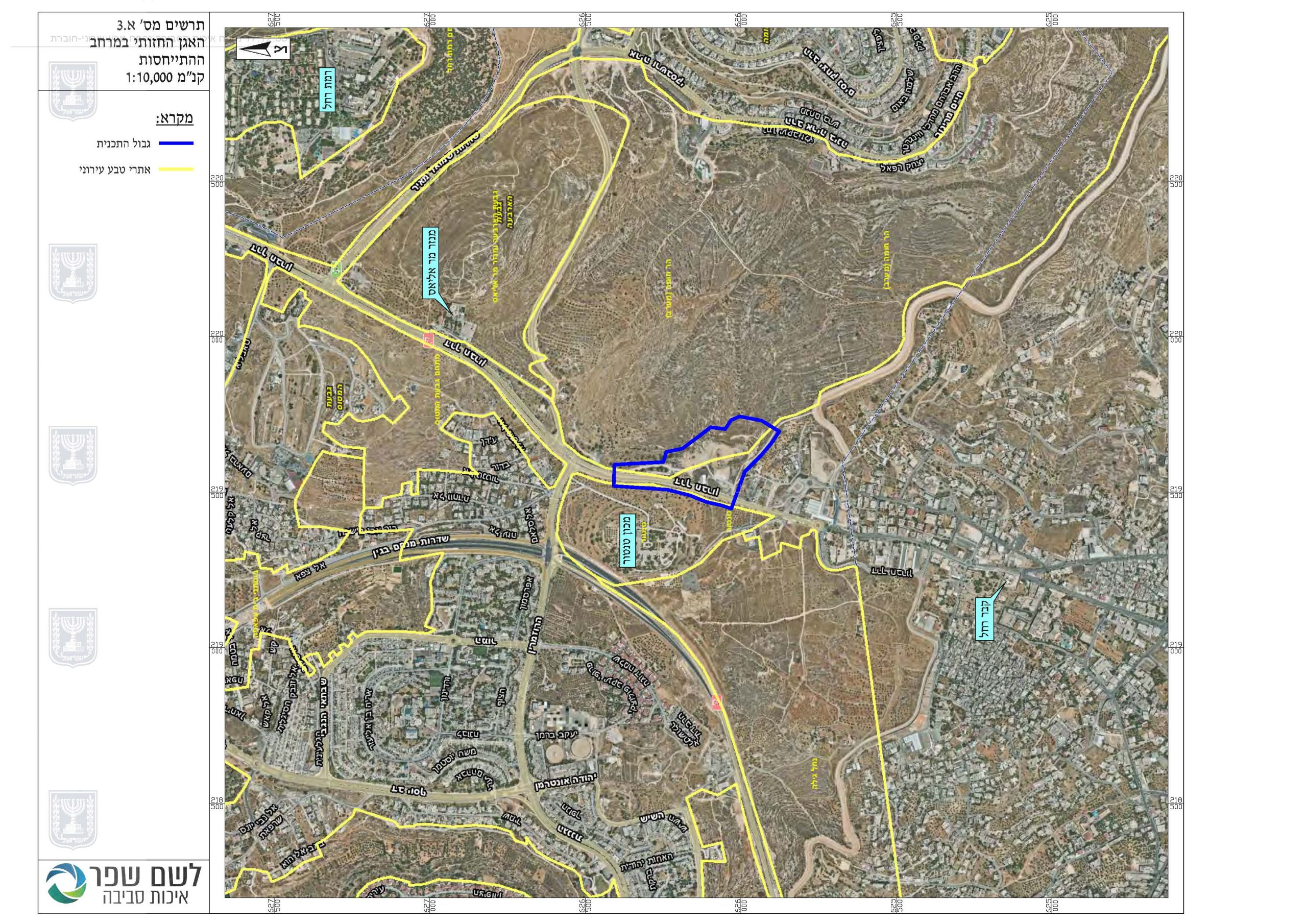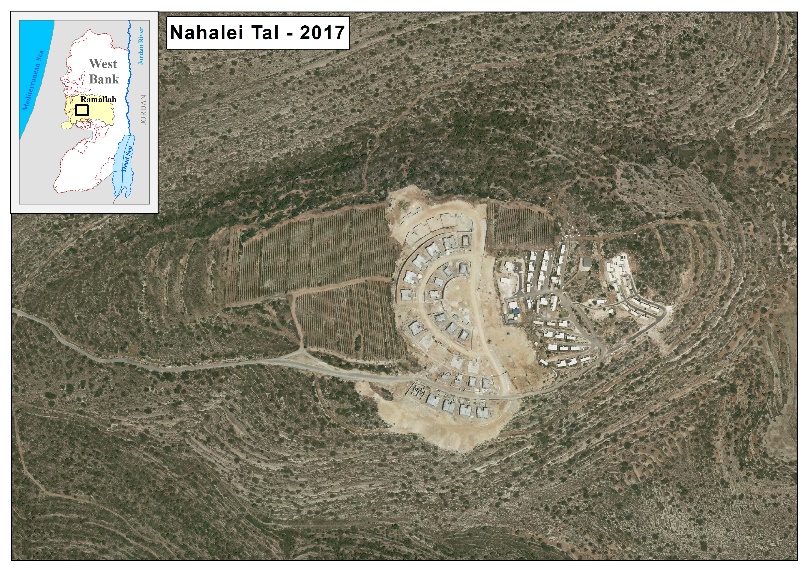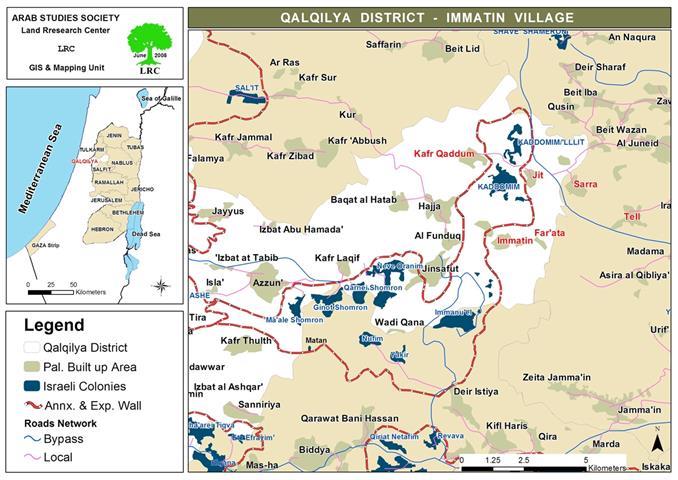Israeli heavy machinery started razing and expansion works at an unprecedented scale in the hills surrounding the Burkan Industrial Compound and the Ariel “Gardens” Industrial Zone in the Governorate of Salfeet. Up to the date of writing this report more than 170 dunums were razed in the vicinity of the colony of Burkan while more than 80 dunums were leveled around Ariel Industrial Zone. The expansion is taking place on lands belonging to Palestinian residents from the villages of Haris, Broqeen and Sarta all of which are located west of the Governorate of Salfeet.
Photo 1 & Photo 2: The colonial expansion in Burkan Industrial Compound – Salfeet Governorate
It should be noted that Israeli occupation authorities seek to attract and to encourage Jewish and foreign investors to invest inside West Bank colonies through providing commercial and industrial incentives including reduction in individual and corporate taxes. That is in addition to providing advanced industrial infrastructure as well as exporting privileges to European countries.
The expansion and razing activities mentioned above are in violation of the commitment promised by the Israeli side at the Annapolis Conference which included an overall freeze of colonial activities in the West Bank. The feverish rate of expansion and transformation these two industrial parks are undergoing is the fastest since their establishment. This fact is considered to be an undeniable proof of the Israeli intention to seize the largest area possible of Palestinian land and to annex it to existing Israeli colonies.
In addition to expansion works, Israeli industrial companies have the tendency to move their factories inside the West Bank as to take advantage of the relatively cheap Palestinian workforce. Moreover, these companies are taking advantage of the fact that such labor falls under the jurisdiction of the Jordanian, rather than the Israeli, labor laws. As such, Palestinian labor inside the West Bank get paid using a much lower payment scale with less labor rights. In turn, Palestinian workers residing under the pressure of unemployment and poverty find themselves forced to accept working in these Israeli factories under unfair conditions.
Photo 3 & Photo 4: The colonial expansion in Burkan Industrial Zone to accommodate new factories.
Burkan and Ariel Gardens Colonies and their Effects on the Environment:
The Burkan industrial colony was built atop lands belonging to the Palestinian villages of Haris, Broqin and Sarta in the governorate of Salfeet. It started as a nuclei for an industrial colony in 1981 and its expansion have started ever since. Currently it has 2720 dunums under its jurisdiction. Its build up area is 349 dunums with a population of 1300 colonists, according to 2005 statistics. Factories presently exist in the colony include oil, plastic and lead factories which negatively affects the Palestinian environment.
As for the Ariel Gardens, it is the industrial park associated with the colony of Ariel which was established in 1999 west of the colony and east of the Palestinian village of Broqin. Tens of dunums from the villages of Haris and Broqin were confiscated for the purpose of establishing the “Gardens” in which tens of factories are currently present.
It is to be noted that the Burqan Industrial Zone has played a major role in polluting the Palestinian environment and in spreading diseases throughout the region via pumping raw sewage from its factories into nearby Palestinian lands. In addition, the Ariel “Gardens” produces sewage that is pumped into the village of Broqin in a stream that sometimes comes as close as 6 meters to some Palestinian houses in the village.
The hazardous environmental effects of the two industrial zones have been discussed a number of times in the Palestinian Ministry of Health and some international arenas. However, nothing has changed in reality. To the contrary, pollution has dramatically increased and is only expected to intensify with the expected increase in the number of factories in the industrial zones.
The outpouring of sewage into the lands of the villages of Broqin and Kafr Al Deek destroys the beautiful landscape in the area and is psychologically depressing due to the awful smell produced by large quantities of sewage. In addition, the animals and plants growing in the area are under the threat of becoming poisoned due to the proliferation of pollutants which might cause a harmful effect on human health on the short and long runs. Not to mention the effect of the sewage on underground water which has led to the pollution of springs used by Palestinians as sources for drinking waters. Samples taken from the springs, cistern and school and house waters in the village of Broqin were tested by the Palestinian Ministry of Health in 2007 and found to be highly polluted.
Photo 5: The sewage of the colony of Burqan flowing into the village of Broqin
In addition to what is stated above, the stagnant water in the valleys of the villages offers the best environment for breeding mosquitoes and other insects including Lishminia-carrying mosquitoes which are currently wide spread in the villages of Broqin and Kafr Al Deek. Since the beginning of 2008, at least 10 cases of Lishminia were reported in the villages of Kafr Al Deek, Broqin and Sarta.
Moreover, the Palestinian Ministry of Health has reported a noticeable increase in the cases of Hepatitis (a), cancer and diarrhea in the area which threatens with the outbreak of other epidemics leading to a real humanitarian crisis in the area.
Prepared by:
The Land Research Center
LRC


